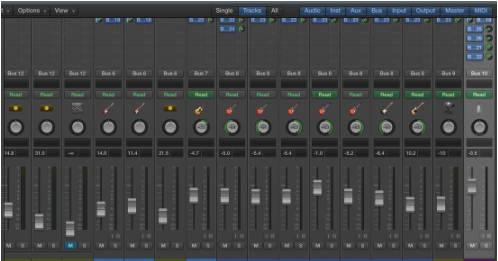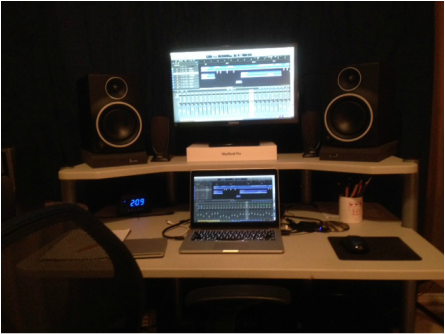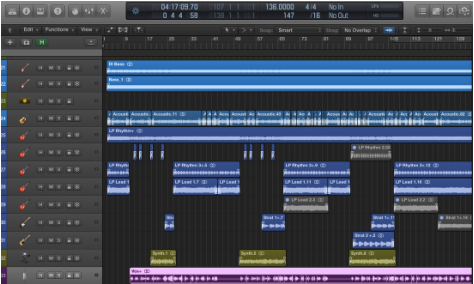Why have your song mixed?
|
You've spent hours, days, maybe even years writing your song. You've put your heart and soul into recording it just the way you want it to sound. So why, after all that, would you need or even want to have someone mix it?
My question is, why wouldn't you? Bringing a mixing engineer into the process can do a several important things to help your carefully crafted record sound even better. To understand how to get the most out of that help, you need to understand what mixing is . . . and what it isn't. |
What mixing is, and what it can do.
No matter how carefully arranged, performed, and recorded your song is, it is an unfortunate fact that in most cases you simply cannot get the clarity necessary to have your recording sound like a professional, radio-ready record from the raw tracks alone. Vocals will often be muffled or inaudible. Keyboard parts get lost. That lead guitar is cool, but it's swallowing the rest of the band. And where, oh where did the bass go (I swear we had one)? Listen to your favorite record carefully, and there are three things that should become immediately obvious (this is true of any genre, but particularly so for rock/pop). First, you can hear each individual part. Second, the lead vocals are out in front of the band; they are "in your face." And third, the rhythm section, especially the drums, should really pop. These things are nearly impossible to achieve with the raw recordings--that's where the mixing engineer comes in.
No matter how carefully arranged, performed, and recorded your song is, it is an unfortunate fact that in most cases you simply cannot get the clarity necessary to have your recording sound like a professional, radio-ready record from the raw tracks alone. Vocals will often be muffled or inaudible. Keyboard parts get lost. That lead guitar is cool, but it's swallowing the rest of the band. And where, oh where did the bass go (I swear we had one)? Listen to your favorite record carefully, and there are three things that should become immediately obvious (this is true of any genre, but particularly so for rock/pop). First, you can hear each individual part. Second, the lead vocals are out in front of the band; they are "in your face." And third, the rhythm section, especially the drums, should really pop. These things are nearly impossible to achieve with the raw recordings--that's where the mixing engineer comes in.

With mixing, we take the individual tracks of your raw recordings through several processing steps to bring the clarity and sheen your song needs to sound really polished. We balance the volume levels so everything is in the same sonic working environment. We use EQ to give each part its own space in that environment so they all work together and can be heard. Where needed, we use processing techniques such as compression to add punch and life. And we can apply polishing processes like panning, reverb/delay, and automation to add contrast, texture, and sheen. Sometimes a song calls for a specialty effect like an echo or maybe an AM radio/telephone effect on the vocal--listen, for example, to Nickelback's Far Away--to make it more interesting. These are all things that can be brought to play in the mixing process to make your song sound much glossier than the raw tracks themselves.
Another important thing a mixing engineer brings to the table is an outside set of ears. The truth is, by the time you've written, rehearsed, and recorded your song, you've heard it too many times to be objective about it. Bringing someone in who is hearing it for the first time--just like your audience will--can lend some important perspective. You really like that secondary guitar part, but maybe it hasn't occurred to you that if you save it until Verse 2, it'll help you build momentum and give the listener something fresh as the song goes along. A mixing engineer can help you here, as well.
To give you an idea of what mixing can accomplish, here's a before and after sample from my album Memories and Dreams (for the best representation of the sound, use external stereo speakers or headphones).
To give you an idea of what mixing can accomplish, here's a before and after sample from my album Memories and Dreams (for the best representation of the sound, use external stereo speakers or headphones).
In the raw sample on the left, I've taken out everything I did during the mix phase. So all of the processing--EQ, compression, parallel techniques, effects, etc.--and all of the volume balancing and panning are removed. These are basically the raw tracks as-recorded. And you can hear that it's a muddy mess. The lead vocals are muffled, and the backing vocals are, well, not exactly "backing." The bass is a little overpowering, and the piano is acting more as a lead instrument than an accompanying texture. And the whole thing just lacks a certain life.
The sample on the right is the final mixed--but unmastered--version, and you should notice a dramatic difference. The overall balance is much better, the lead vocal is out front where it should be, and the backing vocals are, well, in the back. You can hear the instruments--for example, did you even know that B3 organ part was there in the raw track?
That is what mixing is, and what it can do.
The sample on the right is the final mixed--but unmastered--version, and you should notice a dramatic difference. The overall balance is much better, the lead vocal is out front where it should be, and the backing vocals are, well, in the back. You can hear the instruments--for example, did you even know that B3 organ part was there in the raw track?
That is what mixing is, and what it can do.
|
What mixing isn't, and what it can't do.
That said, you need to understand mixing's limitations. Mixing is not magic, and it cannot fix all sins. If your raw recordings aren't of decent quality--say they're littered with A/C hum, or static--or the truth is the performance just wasn't that good, there's only so much a mixer can do to help that. As the saying goes: you can't polish a turd. So if your lead singer sounds like a wounded alley cat, and you are expecting mixing to make that sound like Chris Martin, you're going to be disappointed. Mixing can help your raw tracks sound as good as they are capable of sounding, but it cannot make them better than they inherently are. |
Mixing is also not mastering. With mixing, we are working with the individual raw tracks to blend them together. With mastering, you're dealing with the song as a whole to balance high and low end and add volume, and this is the key thing to understand. When you pop in your favorite CD, that's been mastered to bring the song up to competitive volume levels (and many would say--and I tend to agree--over-compressed and made too loud). Mixing, strictly speaking, is a step earlier than mastering, and the final stereo track that comes out of mixing will generally not be as loud as a commercial record. That's OK, and in fact, that's what you want. The reason for this is you have to leave headroom for the mastering engineer to do what they do. If your record leaves the final mixing process and it's already been brought to commercial volume levels, there is no space left for the mastering engineer to work. We can "pre-master" a mix to give you an idea what your song would sound like volume-wise after mastering, but I strongly recommend removing that treatment before printing a final mix for mastering.
To give you an idea of the difference between mixing and mastering, below are a sample from the final mix, and then the mastered version of the same sample (again, for the best representation of the sound, use external stereo speakers or headphones). Be careful with the volume--the mastered version on the right is considerably louder.
To give you an idea of the difference between mixing and mastering, below are a sample from the final mix, and then the mastered version of the same sample (again, for the best representation of the sound, use external stereo speakers or headphones). Be careful with the volume--the mastered version on the right is considerably louder.

